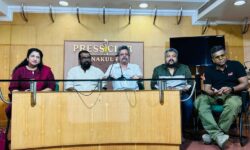KOCHI:
Going forward with its spirit of promoting public discourses on gender fluidity, the Kochi-Muziris Biennale is hosting a talk this Sunday at artist R Aryakrishnan’s exhibition space that is a tribute to queer rights activist Sweet Maria who was brutally murdered in Kerala seven years ago.
A discussion on ‘Disidentifications: Conversations on Everyday Caste and Queerness’ will be held on March 4 evening at Fort Kochi’s Aspinwall House room housing ‘Sweet Maria Monument’ that recounts the life and experiences of Maria.
The programme, at 4 pm, will focus on intersections of caste and sexuality as well as the stereotypes around them, informs Aryakrishnan, 37, whose biennale work explores unwritten histories of queer lives and ‘and their struggles for social justice.
The speakers at the Sunday event are independent researcher Koonal Duggal, intersex activist Chinju Ashwathi and writer-activist Aleena Akashamittayi. While Koonal is working on a project awarded by Sher-Gil Sundaram Art Foundation and AsiaArt Archive (SSAF-AAA) Grant for histories of ideas, art writing, and visual culture, Chinju is the first intersex person to be represented on Kerala’s State Transgender Justice Board. Aleena Akashamittayi, an Ambedkarite, writes on Dalit issues.
Koonal, talking about the importance of such conversations in public spaces, recalls that mainstream Indian society hardly provided public venues till the early 1990s to make queer representations so as to allow the community to express what was going in their minds and bodies. “The majority of mainstream representations that time (that still continues to a great extent) were caricatured, demeaning and stereotypical characterisations of non-gender conforming and transgender identities,” he adds.
According to Koonal, these stereotypical mis-identification surfaces in everyday bullying and name-calling of non-gender-conforming people. “Most of us have gone through such experiences in the institutions of family, school, workplace, neighborhood and other spaces,” says Koonal, who identifies himself as a Dalit queer.
Aryakrishnan’s artwork at the biennale provides a space that includes a bookshelf and a bed where everyone is welcome to spend time and engage with the exhibited archive and art. “The fluid nature of the space mirrors the fluidity of identity, and the various dimensions it acquires in various spaces and contexts,” says the Delhi-based artist, who originally hails from Pathanamthitta in south-central Kerala. “By activating this archive through public participation in Kochi and other performances and lectures, I am trying to engage with questions concerning justice for the transgender communities.”




